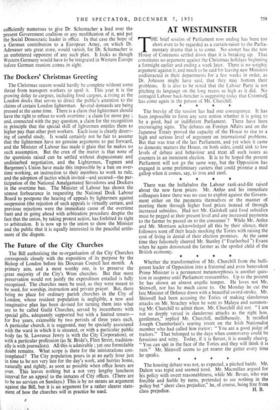The Dockers' Christmas Greeting
The Christmas season would hardly be complete without some threat from transport workers to spoil it. This year it is the growing delay to cargoes, including food cargoes, a:riving at the London docks that serves to direct the public's attention to the claims of certain London lighterman. Several demands are being pressed at the same time. There is a claim that lightermen should have the right to refuse to work overtime ; a claim for more pay ; and, connected with the pay question, a claim for the recognition in principle that the special skill of lightermen entitles them to higher pay than other port workers. Each issue is clearly deserv- ing of careful study. It would certainly not be fair to assume that the lightermen have n6 genuine arguments to put forward, and the Minister of Labour has made it plain that he makes no such assumption. But the crux of the matter is that none of the questions raised can be settled without dispassionate and undisturbed negotiation, and the Lightermen, Tugmen and Bargemen's Union have made this impossible by a ban on over- time working, an instruction to their members to work to rule, and the adoption of tactics which invited—and secured—the par- ticipation of the National Amalgamated Stevedores and Dockers in the overtime ban. The Minister of Labour has shown the utmost forbearance in requesting the National Dock Labour Board to postpone the hearing of appeals by lightermen against suspension (the rejection of such appeals is virtually certain, and previous rejections were the immediate cause of the overtime ban) and in going ahead with arbitration procedure despite the fact that the union, by taking protest action, has forfeited its right to arbitration. It is now up to the union to show the Minister and the public that it is equally interested in the peaceful settle- ment of the dispute.


















































 Previous page
Previous page